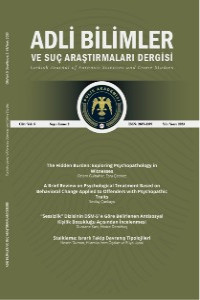Uluslararası Suç Faillerinin Yargılamasında “Öncelik” Sorunu: Tamamlayıcılık İlkesinin Aşılması
İnsanlığı bir bütün olarak ilgilendiren en ciddi suçların cezasız kalma- ması amacı ile kurulan Uluslararası Ceza Mahkemesi’nin en temel taşla- rından biri tamamlayıcı olma niteliğidir. Güvenlik Konseyi ise uluslararası barış ve güvenliğin korunmasında Birlemiş Milletler örgütünün başlıca sorumluluk sahibi organıdır. İnsanlığın barış ve güvenlik içinde, adil bir biçimde yaşamasına hizmet eden bu örgütler ile egemen devletlerin ke- sişme noktalarında birtakım kural, hak ve sorumluluklar çatışma içerisine girebilmektedir. Güvenlik Konseyi’nin VII. Bölüm kapsamında aldığı sevk kararları Mahkeme’nin yargı yetkisinin tetiklenmesi yollarından biridir. Karar, taraf olmayan devletlerin Roma Statüsü kapsamında yargılanmasını mümkün hale getirmesi, Birleşmiş Milletler üyesi devletlerin Konsey karar- larına uyma yükümlülüğünün bulunması ve nihai olarak, Uluslararası Ceza Mahkemesi’nin devletlerin ulusal yargı yetkisinin birincilliğini kabul eden tamamlayıcı bir mahkeme olması noktalarında tartışmalı hale gelmektedir. Çalışma Uluslararası Ceza Mahkeme’nin yargı yetkisine giren uluslarara- sı suç faillerinin yargılanmasında birincil cezai yargı yetkisine sahip olan devletlerin bu yetkisinin Birleşmiş Milletler Güvenlik Konseyi sevkleri sa- yesinde aşıldığını iddia etmektedir. Nihayetinde bu durumun Mahkeme’nin tamamlayıcılık özelliği ile bağdaşmadığı sonucuna varmaktadır.
Anahtar Kelimeler:
Uluslararası Ceza Mahkemesi, Birleşmiş Milletler Güvenlik Konseyi, sevk yetkisi, tamamlayıcılık ilkesi
The “Priority” as a Question in the Prosecution of Perpetrators of International Crimes: Exceeding the Complementarity Principle
One of the cornerstones of the International Criminal Court(ICC), which was established with the aim of ensuring that the most serious crimes that concern humanity as a whole, do not go unpunished, is its comple- mentary nature. The Security Council, on the other hand, is the organ that has the primary responsibility of the United Nations (UN) for the mainte- nance of international peace and security. There may be conflict between these international organizations that serve for humanity to live in peace and security and sovereign states at the intersection of some rules, rights and responsibilities. Security Council’s referrals taken under the Chapter VII of UN Charter are one of the ways in which the Court’s jurisdiction is triggered. The controversy about referrals arise because it enables non- party states to be prosecuted under the Rome Statute, member states of the UN have an obligation to comply with the resolutions of the Council, and ultimately the International Criminal Court is a complementary court that recognizes the primacy of the national jurisdiction of the states.
This study claims that the authority of the states that have primary jurisdi- ction in the prosecution of international criminal offenders within the ju- risdiction of the Court has been exceeded through the referrals of the UN Security Council. As a conclusion it is asserted that this is incompatible with the Court’s complementarity principle.
Keywords:
International Criminal Court, United Nations Security Coun- cil, referral, principle of complementarity,
___
- Acer, Y., & Kaya, İ. (2019). Uluslararası Hukuk (10. bs). Seçkin. Archibong, J. E., & Lloyd, C. J. (2021). Long Road To Justıce: Omar Al-Bashır And The Issue Of Heınous Crımes In Darfur. Journal of Organizational Culture, Communications and Conflict, 2(25), ss.1-10.
- Arslanel, M. N., & Eryücel, E. (2013). Küreselleşme Sürecinde Egemenlik Kavramının Dönüşümü / The Transformation of the Concept of Sovereignty in the Process of Globalization. Atatürk Üniversitesi Sosyal Bilimler Enstitüsü Dergisi, 17(1), Art. 1. ss.23-36.
- Bozkurt, E., Kütükçü, M. A., & Poyraz, Y. (2009). Devletler Hukuku. Yetkin Yayınları.
- El Zeidy, M. M. (2001). The Principle Of Complementarity: A New Machinery To Implement International Criminal Law. Mich. J. Int’l L., 23(4), ss.869-975.
- Erdal, S. (2010). Uluslararası Ceza Mahkemesinin Ulus-Devlet Egemenliğine Etkisi [Yayımlanmamış Doktora Tezi]. Selçuk Üniversitesi Sosyal Bilimler Enstitüsü. Fouladvand, S. (2014). Complementarity and Cultural Sensitivity: Decision-making by the International Criminal Court Prosecutor in the Darfur Situation. International Criminal Law Review, 14(6), ss.1028-1066.
- Fransson, C. (2004). The principle of complementarity in the Rome Statute—Security Council Referrals- [Yayımlanmamış Yüksek Lisans Tezi]. Lund Üniversitesi.
- Keskin, F. (1998). Uluslararası Hukukta Kuvvet Kullanma: Savaş, Karışma ve Birleşmiş Milletler. Mülkiyeliler Birliği.
- Kuperman, A. J. (2013). NATO’s Intervention in Libya: A Humanitarian Success? Içinde A. Hehir & R. Murray (Ed.), Libya, the Responsibility to Protect and the Future of Humanitarian Intervention, Palgrave Macmillan UK. ss.191-221.
- Lentner, G. M. (2018). The UN Security Council and the International Criminal Court: The referral mechanism in theory and practice. Edward Elgar Publishing.
- Nsereko, D. D. N. (2004). Triggering the jurisdiction of the International Criminal Court. African Human Rights Law Journal, 4(2), ss.256-274.
- Policy Paper on Preliminary Examinations. (2013). [Politika Belgesi]. Uluslararası Ceza Mahkemesi SAvcılık Bürosu. https://www.icc-cpi.int/sites/default/files/iccdocs/otp/ OTP- Policy_Paper_Preliminary_Examinations_2013-ENG.pdf
- Poyraz, Y., & Önen, Ö. V. (2019). Uluslararası Ceza Yargısının Gelişiminde Uluslararası Ceza Mahkemesinin Rolü. Yıldırım Beyazıt Hukuk Dergisi, 1(1), ss.187-222. Security Council Resolution 1970 (2011) -UNSCR. (2011, Şubat 26). https://ww w.undocs.org/Home /Mobile?FinalSymbol=S%2FRES%2F1970%2520(20 11)&Language=E&DeviceType=Desktop&LangRequested=False
- Stahn, C. (2012). Libya, the International Criminal Court and complementarity: A test for ‘shared responsibility’. Journal of International Criminal Justice, 10(2), ss.325-349. Summary of the Decision on the admissibility of the case against Mr Gaddafi. (2014, Mayıs 21). International Criminal Court. https://www.icc-cpi.int/sites/default/files/ itemsDocuments/pr911/Summary-of-the-Decision-on-the-admissibility-of-the-case- against-Mr-Gaddafi.pdf
- Tezcan, D., Erdem, M. R., & Önok, R. M. (2017). Uluslararası Ceza Hukuku (4. bs). Seçkin.
- Töngür, A. R. (2005). Uluslararası Ceza Mahkemesinin Kapsamı ve Yargılama Hukuku. Seçkin Yayıncılık.
- United Nations Security Council Resolution 1593 (2005). (2005). https://digitallibrary. un.org/record/544817#record-files-collapse-header
- Verhoeven, S., Wouters, J., & Demeyere, B. (2008). The International Criminal Court’s Office of the Prosecutor: Navigating between Independence and Accountability?
- International Criminal Law Review, 8(1-2), ss.273-317.
- Yang, L. (2005). On the Principle of Complementarity in the Rome Statute of the International Criminal Court. Chinese Journal of International Law, 4(1), ss.121-132. Zolo, D. (2020). Victors’ Justice: From Nuremberg to Baghdad. Verso Books.
- ISSN: 2687-3397
- Başlangıç: 2020
- Yayıncı: Polis Akademisi
Sayıdaki Diğer Makaleler
Adli Davranış Genetiği ve Bağırsak Florası İlişkisi
Kent ve Suç İlişkisi Üzerine Bir Değerlendirme
Sosyal Sermaye Gerçekliğinde Hükümlülerin Polis Müdahalesine Yönelik Deneyimleri
Merve Reyhan BAYEGDLİ, Yusuf ŞAHİN
Çocuk ve Genç Suçluluğu Örneğinde Aile Kurumunun Suç Önleyici Etkisi
Uluslararası Suç Faillerinin Yargılamasında “Öncelik” Sorunu: Tamamlayıcılık İlkesinin Aşılması
